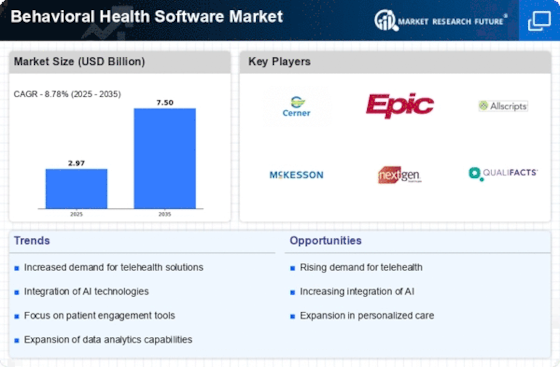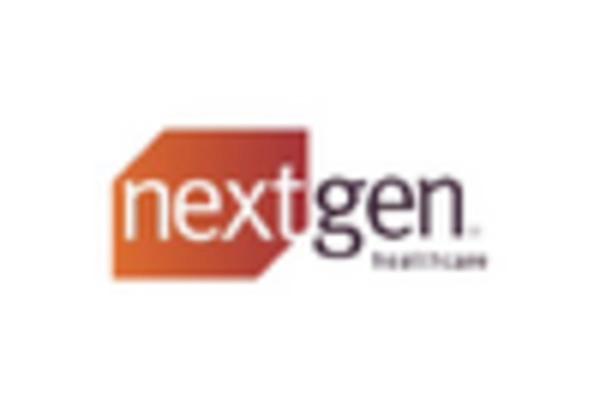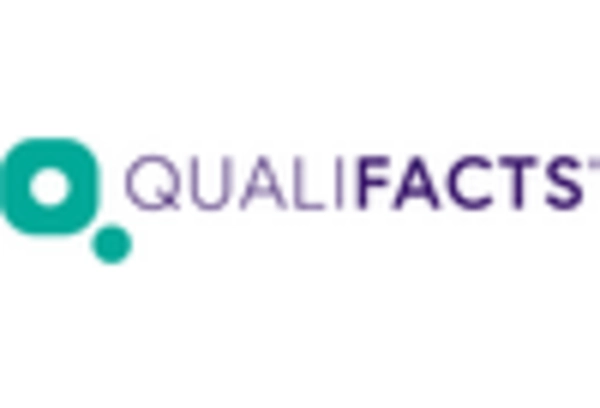Clinical Workflow Management
Patient Engagement
Telehealth
Analytics
On-Premises
Cloud-Based
Hybrid
Hospitals
Psychiatrists
Counseling Centers
Rehabilitation Centers
Subscription
Perpetual License
Pay-Per-Use
North America
Europe
South America
Asia Pacific
Middle East and Africa
North America Outlook (USD Billion, 2019-2035)
North America Behavioral Health Software Market by Software Type
Clinical Workflow Management
Patient Engagement
Telehealth
Analytics
North America Behavioral Health Software Market by Deployment Mode Type
On-Premises
Cloud-Based
Hybrid
North America Behavioral Health Software Market by End User Type
Hospitals
Psychiatrists
Counseling Centers
Rehabilitation Centers
North America Behavioral Health Software Market by Pricing Model Type
Subscription
Perpetual License
Pay-Per-Use
North America Behavioral Health Software Market by Regional Type
US
Canada
US Outlook (USD Billion, 2019-2035)
US Behavioral Health Software Market by Software Type
Clinical Workflow Management
Patient Engagement
Telehealth
Analytics
US Behavioral Health Software Market by Deployment Mode Type
On-Premises
Cloud-Based
Hybrid
US Behavioral Health Software Market by End User Type
Hospitals
Psychiatrists
Counseling Centers
Rehabilitation Centers
US Behavioral Health Software Market by Pricing Model Type
Subscription
Perpetual License
Pay-Per-Use
CANADA Outlook (USD Billion, 2019-2035)
CANADA Behavioral Health Software Market by Software Type
Clinical Workflow Management
Patient Engagement
Telehealth
Analytics
CANADA Behavioral Health Software Market by Deployment Mode Type
On-Premises
Cloud-Based
Hybrid
CANADA Behavioral Health Software Market by End User Type
Hospitals
Psychiatrists
Counseling Centers
Rehabilitation Centers
CANADA Behavioral Health Software Market by Pricing Model Type
Subscription
Perpetual License
Pay-Per-Use
Europe Outlook (USD Billion, 2019-2035)
Europe Behavioral Health Software Market by Software Type
Clinical Workflow Management
Patient Engagement
Telehealth
Analytics
Europe Behavioral Health Software Market by Deployment Mode Type
On-Premises
Cloud-Based
Hybrid
Europe Behavioral Health Software Market by End User Type
Hospitals
Psychiatrists
Counseling Centers
Rehabilitation Centers
Europe Behavioral Health Software Market by Pricing Model Type
Subscription
Perpetual License
Pay-Per-Use
Europe Behavioral Health Software Market by Regional Type
Germany
UK
France
Russia
Italy
Spain
Rest of Europe
GERMANY Outlook (USD Billion, 2019-2035)
GERMANY Behavioral Health Software Market by Software Type
Clinical Workflow Management
Patient Engagement
Telehealth
Analytics
GERMANY Behavioral Health Software Market by Deployment Mode Type
On-Premises
Cloud-Based
Hybrid
GERMANY Behavioral Health Software Market by End User Type
Hospitals
Psychiatrists
Counseling Centers
Rehabilitation Centers
GERMANY Behavioral Health Software Market by Pricing Model Type
Subscription
Perpetual License
Pay-Per-Use
UK Outlook (USD Billion, 2019-2035)
UK Behavioral Health Software Market by Software Type
Clinical Workflow Management
Patient Engagement
Telehealth
Analytics
UK Behavioral Health Software Market by Deployment Mode Type
On-Premises
Cloud-Based
Hybrid
UK Behavioral Health Software Market by End User Type
Hospitals
Psychiatrists
Counseling Centers
Rehabilitation Centers
UK Behavioral Health Software Market by Pricing Model Type
Subscription
Perpetual License
Pay-Per-Use
FRANCE Outlook (USD Billion, 2019-2035)
FRANCE Behavioral Health Software Market by Software Type
Clinical Workflow Management
Patient Engagement
Telehealth
Analytics
FRANCE Behavioral Health Software Market by Deployment Mode Type
On-Premises
Cloud-Based
Hybrid
FRANCE Behavioral Health Software Market by End User Type
Hospitals
Psychiatrists
Counseling Centers
Rehabilitation Centers
FRANCE Behavioral Health Software Market by Pricing Model Type
Subscription
Perpetual License
Pay-Per-Use
RUSSIA Outlook (USD Billion, 2019-2035)
RUSSIA Behavioral Health Software Market by Software Type
Clinical Workflow Management
Patient Engagement
Telehealth
Analytics
RUSSIA Behavioral Health Software Market by Deployment Mode Type
On-Premises
Cloud-Based
Hybrid
RUSSIA Behavioral Health Software Market by End User Type
Hospitals
Psychiatrists
Counseling Centers
Rehabilitation Centers
RUSSIA Behavioral Health Software Market by Pricing Model Type
Subscription
Perpetual License
Pay-Per-Use
ITALY Outlook (USD Billion, 2019-2035)
ITALY Behavioral Health Software Market by Software Type
Clinical Workflow Management
Patient Engagement
Telehealth
Analytics
ITALY Behavioral Health Software Market by Deployment Mode Type
On-Premises
Cloud-Based
Hybrid
ITALY Behavioral Health Software Market by End User Type
Hospitals
Psychiatrists
Counseling Centers
Rehabilitation Centers
ITALY Behavioral Health Software Market by Pricing Model Type
Subscription
Perpetual License
Pay-Per-Use
SPAIN Outlook (USD Billion, 2019-2035)
SPAIN Behavioral Health Software Market by Software Type
Clinical Workflow Management
Patient Engagement
Telehealth
Analytics
SPAIN Behavioral Health Software Market by Deployment Mode Type
On-Premises
Cloud-Based
Hybrid
SPAIN Behavioral Health Software Market by End User Type
Hospitals
Psychiatrists
Counseling Centers
Rehabilitation Centers
SPAIN Behavioral Health Software Market by Pricing Model Type
Subscription
Perpetual License
Pay-Per-Use
REST OF EUROPE Outlook (USD Billion, 2019-2035)
REST OF EUROPE Behavioral Health Software Market by Software Type
Clinical Workflow Management
Patient Engagement
Telehealth
Analytics
REST OF EUROPE Behavioral Health Software Market by Deployment Mode Type
On-Premises
Cloud-Based
Hybrid
REST OF EUROPE Behavioral Health Software Market by End User Type
Hospitals
Psychiatrists
Counseling Centers
Rehabilitation Centers
REST OF EUROPE Behavioral Health Software Market by Pricing Model Type
Subscription
Perpetual License
Pay-Per-Use
APAC Outlook (USD Billion, 2019-2035)
APAC Behavioral Health Software Market by Software Type
Clinical Workflow Management
Patient Engagement
Telehealth
Analytics
APAC Behavioral Health Software Market by Deployment Mode Type
On-Premises
Cloud-Based
Hybrid
APAC Behavioral Health Software Market by End User Type
Hospitals
Psychiatrists
Counseling Centers
Rehabilitation Centers
APAC Behavioral Health Software Market by Pricing Model Type
Subscription
Perpetual License
Pay-Per-Use
APAC Behavioral Health Software Market by Regional Type
China
India
Japan
South Korea
Malaysia
Thailand
Indonesia
Rest of APAC
CHINA Outlook (USD Billion, 2019-2035)
CHINA Behavioral Health Software Market by Software Type
Clinical Workflow Management
Patient Engagement
Telehealth
Analytics
CHINA Behavioral Health Software Market by Deployment Mode Type
On-Premises
Cloud-Based
Hybrid
CHINA Behavioral Health Software Market by End User Type
Hospitals
Psychiatrists
Counseling Centers
Rehabilitation Centers
CHINA Behavioral Health Software Market by Pricing Model Type
Subscription
Perpetual License
Pay-Per-Use
INDIA Outlook (USD Billion, 2019-2035)
INDIA Behavioral Health Software Market by Software Type
Clinical Workflow Management
Patient Engagement
Telehealth
Analytics
INDIA Behavioral Health Software Market by Deployment Mode Type
On-Premises
Cloud-Based
Hybrid
INDIA Behavioral Health Software Market by End User Type
Hospitals
Psychiatrists
Counseling Centers
Rehabilitation Centers
INDIA Behavioral Health Software Market by Pricing Model Type
Subscription
Perpetual License
Pay-Per-Use
JAPAN Outlook (USD Billion, 2019-2035)
JAPAN Behavioral Health Software Market by Software Type
Clinical Workflow Management
Patient Engagement
Telehealth
Analytics
JAPAN Behavioral Health Software Market by Deployment Mode Type
On-Premises
Cloud-Based
Hybrid
JAPAN Behavioral Health Software Market by End User Type
Hospitals
Psychiatrists
Counseling Centers
Rehabilitation Centers
JAPAN Behavioral Health Software Market by Pricing Model Type
Subscription
Perpetual License
Pay-Per-Use
SOUTH KOREA Outlook (USD Billion, 2019-2035)
SOUTH KOREA Behavioral Health Software Market by Software Type
Clinical Workflow Management
Patient Engagement
Telehealth
Analytics
SOUTH KOREA Behavioral Health Software Market by Deployment Mode Type
On-Premises
Cloud-Based
Hybrid
SOUTH KOREA Behavioral Health Software Market by End User Type
Hospitals
Psychiatrists
Counseling Centers
Rehabilitation Centers
SOUTH KOREA Behavioral Health Software Market by Pricing Model Type
Subscription
Perpetual License
Pay-Per-Use
MALAYSIA Outlook (USD Billion, 2019-2035)
MALAYSIA Behavioral Health Software Market by Software Type
Clinical Workflow Management
Patient Engagement
Telehealth
Analytics
MALAYSIA Behavioral Health Software Market by Deployment Mode Type
On-Premises
Cloud-Based
Hybrid
MALAYSIA Behavioral Health Software Market by End User Type
Hospitals
Psychiatrists
Counseling Centers
Rehabilitation Centers
MALAYSIA Behavioral Health Software Market by Pricing Model Type
Subscription
Perpetual License
Pay-Per-Use
THAILAND Outlook (USD Billion, 2019-2035)
THAILAND Behavioral Health Software Market by Software Type
Clinical Workflow Management
Patient Engagement
Telehealth
Analytics
THAILAND Behavioral Health Software Market by Deployment Mode Type
On-Premises
Cloud-Based
Hybrid
THAILAND Behavioral Health Software Market by End User Type
Hospitals
Psychiatrists
Counseling Centers
Rehabilitation Centers
THAILAND Behavioral Health Software Market by Pricing Model Type
Subscription
Perpetual License
Pay-Per-Use
INDONESIA Outlook (USD Billion, 2019-2035)
INDONESIA Behavioral Health Software Market by Software Type
Clinical Workflow Management
Patient Engagement
Telehealth
Analytics
INDONESIA Behavioral Health Software Market by Deployment Mode Type
On-Premises
Cloud-Based
Hybrid
INDONESIA Behavioral Health Software Market by End User Type
Hospitals
Psychiatrists
Counseling Centers
Rehabilitation Centers
INDONESIA Behavioral Health Software Market by Pricing Model Type
Subscription
Perpetual License
Pay-Per-Use
REST OF APAC Outlook (USD Billion, 2019-2035)
REST OF APAC Behavioral Health Software Market by Software Type
Clinical Workflow Management
Patient Engagement
Telehealth
Analytics
REST OF APAC Behavioral Health Software Market by Deployment Mode Type
On-Premises
Cloud-Based
Hybrid
REST OF APAC Behavioral Health Software Market by End User Type
Hospitals
Psychiatrists
Counseling Centers
Rehabilitation Centers
REST OF APAC Behavioral Health Software Market by Pricing Model Type
Subscription
Perpetual License
Pay-Per-Use
South America Outlook (USD Billion, 2019-2035)
South America Behavioral Health Software Market by Software Type
Clinical Workflow Management
Patient Engagement
Telehealth
Analytics
South America Behavioral Health Software Market by Deployment Mode Type
On-Premises
Cloud-Based
Hybrid
South America Behavioral Health Software Market by End User Type
Hospitals
Psychiatrists
Counseling Centers
Rehabilitation Centers
South America Behavioral Health Software Market by Pricing Model Type
Subscription
Perpetual License
Pay-Per-Use
South America Behavioral Health Software Market by Regional Type
Brazil
Mexico
Argentina
Rest of South America
BRAZIL Outlook (USD Billion, 2019-2035)
BRAZIL Behavioral Health Software Market by Software Type
Clinical Workflow Management
Patient Engagement
Telehealth
Analytics
BRAZIL Behavioral Health Software Market by Deployment Mode Type
On-Premises
Cloud-Based
Hybrid
BRAZIL Behavioral Health Software Market by End User Type
Hospitals
Psychiatrists
Counseling Centers
Rehabilitation Centers
BRAZIL Behavioral Health Software Market by Pricing Model Type
Subscription
Perpetual License
Pay-Per-Use
MEXICO Outlook (USD Billion, 2019-2035)
MEXICO Behavioral Health Software Market by Software Type
Clinical Workflow Management
Patient Engagement
Telehealth
Analytics
MEXICO Behavioral Health Software Market by Deployment Mode Type
On-Premises
Cloud-Based
Hybrid
MEXICO Behavioral Health Software Market by End User Type
Hospitals
Psychiatrists
Counseling Centers
Rehabilitation Centers
MEXICO Behavioral Health Software Market by Pricing Model Type
Subscription
Perpetual License
Pay-Per-Use
ARGENTINA Outlook (USD Billion, 2019-2035)
ARGENTINA Behavioral Health Software Market by Software Type
Clinical Workflow Management
Patient Engagement
Telehealth
Analytics
ARGENTINA Behavioral Health Software Market by Deployment Mode Type
On-Premises
Cloud-Based
Hybrid
ARGENTINA Behavioral Health Software Market by End User Type
Hospitals
Psychiatrists
Counseling Centers
Rehabilitation Centers
ARGENTINA Behavioral Health Software Market by Pricing Model Type
Subscription
Perpetual License
Pay-Per-Use
REST OF SOUTH AMERICA Outlook (USD Billion, 2019-2035)
REST OF SOUTH AMERICA Behavioral Health Software Market by Software Type
Clinical Workflow Management
Patient Engagement
Telehealth
Analytics
REST OF SOUTH AMERICA Behavioral Health Software Market by Deployment Mode Type
On-Premises
Cloud-Based
Hybrid
REST OF SOUTH AMERICA Behavioral Health Software Market by End User Type
Hospitals
Psychiatrists
Counseling Centers
Rehabilitation Centers
REST OF SOUTH AMERICA Behavioral Health Software Market by Pricing Model Type
Subscription
Perpetual License
Pay-Per-Use
MEA Outlook (USD Billion, 2019-2035)
MEA Behavioral Health Software Market by Software Type
Clinical Workflow Management
Patient Engagement
Telehealth
Analytics
MEA Behavioral Health Software Market by Deployment Mode Type
On-Premises
Cloud-Based
Hybrid
MEA Behavioral Health Software Market by End User Type
Hospitals
Psychiatrists
Counseling Centers
Rehabilitation Centers
MEA Behavioral Health Software Market by Pricing Model Type
Subscription
Perpetual License
Pay-Per-Use
MEA Behavioral Health Software Market by Regional Type
GCC Countries
South Africa
Rest of MEA
GCC COUNTRIES Outlook (USD Billion, 2019-2035)
GCC COUNTRIES Behavioral Health Software Market by Software Type
Clinical Workflow Management
Patient Engagement
Telehealth
Analytics
GCC COUNTRIES Behavioral Health Software Market by Deployment Mode Type
On-Premises
Cloud-Based
Hybrid
GCC COUNTRIES Behavioral Health Software Market by End User Type
Hospitals
Psychiatrists
Counseling Centers
Rehabilitation Centers
GCC COUNTRIES Behavioral Health Software Market by Pricing Model Type
Subscription
Perpetual License
Pay-Per-Use
SOUTH AFRICA Outlook (USD Billion, 2019-2035)
SOUTH AFRICA Behavioral Health Software Market by Software Type
Clinical Workflow Management
Patient Engagement
Telehealth
Analytics
SOUTH AFRICA Behavioral Health Software Market by Deployment Mode Type
On-Premises
Cloud-Based
Hybrid
SOUTH AFRICA Behavioral Health Software Market by End User Type
Hospitals
Psychiatrists
Counseling Centers
Rehabilitation Centers
SOUTH AFRICA Behavioral Health Software Market by Pricing Model Type
Subscription
Perpetual License
Pay-Per-Use
REST OF MEA Outlook (USD Billion, 2019-2035)
REST OF MEA Behavioral Health Software Market by Software Type
Clinical Workflow Management
Patient Engagement
Telehealth
Analytics
REST OF MEA Behavioral Health Software Market by Deployment Mode Type
On-Premises
Cloud-Based
Hybrid
REST OF MEA Behavioral Health Software Market by End User Type
Hospitals
Psychiatrists
Counseling Centers
Rehabilitation Centers
REST OF MEA Behavioral Health Software Market by Pricing Model Type
Subscription
Perpetual License
Pay-Per-Use


















Leave a Comment